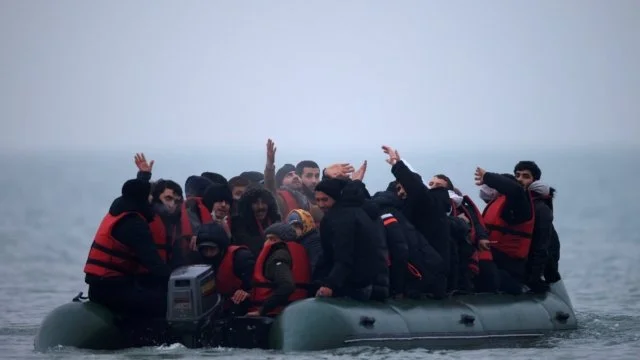When Humanity Lacks Compassion
Wednesday 24 November marked another tragedy in the ongoing channel crisis as a further 27 people died during an attempted crossing.
Photo: REUTERS/Gonzalo Fuentes
For over two decades, politicians from across the political spectrum have vowed to end the “evil trade” of human beings. But such promises have proven empty. In many ways, the situation in 2021 is no better than that of the year 2000, when the bodies of 58 dead migrants were found in the back of a lorry in Dover.
In the wake of this most recent tragedy, the comments of Boris Johnson have not only been insensitive, but also unhelpful. The demand of France to “take back” the migrants who make such perilous journeys will do nothing to tackle the issue of human trafficking, nor prevent future disasters from occurring. This is not simply an issue about borders, it cannot be solved by Brexit or the vague Nationality and Borders Bill. This is a global issue, a human crisis, and one that requires a compassionate approach.
When humanity lacks compassion, all else is lost.
There’s no denying that migration is a touchy subject, especially for the 17 million Britons who voted to leave the European Union. But as a supposed world leader, Britain has a role to play in supporting the rights of migrants, especially those fleeing conflicts and political instability. We should be advocating for the protection of vulnerable persons, the housing of refugees, and the rights of those individuals under the 1951 Refugee Convention.
However, instead of leading such a charge, the political sentiment within modern British politics is to raise barriers and close borders. Such a narrow-minded approach can only be described as selfish.
There’s no denying that the operations of people smugglers are completely wrong. The issue, though, goes far beyond such a dastardly trade. This is about our fellow human beings attempting to escape a well-founded fear of persecution. Individuals don’t risk their lives, travelling many thousands of perilous miles, simply for economic reasons. They do this out of desperation – a desperation that many seem to overlook.
Historically, Britain isn’t a stranger to supporting asylum seekers. In fact, it could be argued that the national identity of this great' country is founded through the diverse and multicultural roots of its communities. In the 1930s we opened our arms to around 80,000 Jewish refugees; the 1970s saw the resettlement of an estimated 27,000 Asian Ugandans; and between 1979 and 1992 Britain became home to around 20,000 Vietnamese asylum seekers. Such acts of compassion – assisting those who are vulnerable during their time of need – are within our moral obligations, because regardless of where we come from, what we look like, how we eat, how we dress, and how we pray, we are all human.
In recent years, something has been lost in translation. This moral obligation seems to have been forgotten. Instead of leading the solutions to the humanitarian crises of displaced people across the globe, Britain’s lacklustre approach has become insensitive: our politicians have become preoccupied with soundbites surrounding the protection of our borders, forgetting the reality of the so-called ‘Jungle’ in Calais and the estimated 26.4 million refugees worldwide.
We’re talking about people here. Our fellow human-beings.
It’s too easy to get bogged down by language and to assume that what one doesn’t see isn’t really happening. The seemingly-interchangeable words ‘migrant’, ‘immigrant’, ‘refugee’ and ‘asylum seeker’ are in fact very different, and the confusion of these terms has made for a muddled debate amongst the wider public. We must do our best to differentiate between migrating persons, between those emigrating out of personal choice or economic motivations, and those fleeing from conflict. This does not mean opening our borders to anyone and everyone, but opening our minds to the difficulties faced by those from war-torn and authoritarian countries.
In order to reduce the number of dangerous and illegal crossings in the British channel, we must first increase the accessibility of legitimate pathways for all those fleeing from persecution.
The pandemic has put a significant toll on the foreign office’s endeavours to assist those seeking asylum, and the Vulnerable Persons Resettlement Scheme (VPRS), the programme through which asylum was granted in the UK up until 2020, has been met with no clear replacement. This is highly embarrassing given the amount of time that successive governments have had to prepare for such an eventuality.
Issues of forcibly displaced persons cannot be solved overnight, nor can they be solved by the proposition of tighter borders and more frequent maritime patrols as the government has repeatedly suggested. This is a complex, global problem, and one that requires a multilateral solution.
The redaction of Priti Patel’s invite to talks with her European counterparts is a consequence of the government’s insensitive approach to the issue thus far. If the Conservatives are truly committed to erradicating human trafficking, they must drop the populist-based rhetoric which confuses the public and muddies the debate.
Human trafficking is an appalling issue, one that poses a risk to many thousands of lives as criminal gangs profit from the world’s most vulnerable – those fleeing from persecution.
Only desperation can fuel such a trade, and only global partnership will provide a solution.
Pi Opinion content does not necessarily reflect the views of the editorial team, Pi Media society, Students’ Union UCL or University College London. We aim to publish opinions from across the student body — if you read anything you would like to respond to, get in touch via email.

